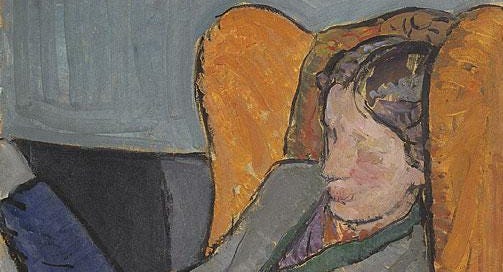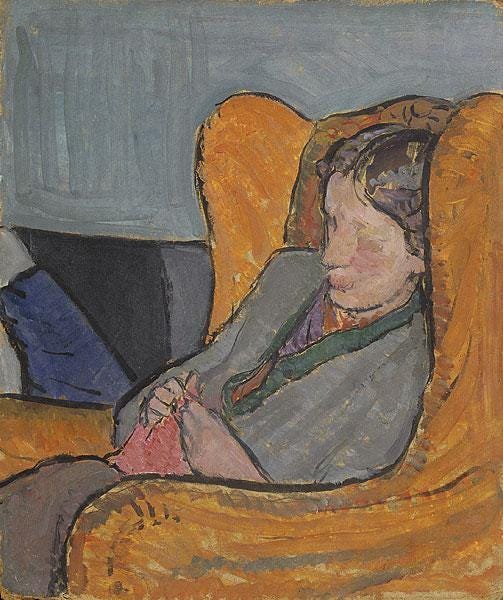What Edith Wharton might have said about whether anyone buys books anymore
No, not really, just a list of some of my favorite novels about writers
I have to admit, I’m rather proud of myself for staying out of the whole “nobody buys books” publishing conflagration on various writing corners of social media the last few weeks. Like so many “conflicts” that develop on social media, I found it deeply puzzling. What were we arguing about exactly? The actual facts of whether books sell? Well, of course they do. But probably not as many as most people (including authors like me) imagine.
Not surprisingly, we like to hold up the stories of amazing publishing success. America loves a boot-strap, rags-to-riches story, so unless you do a deep dive into the publishing world, you won’t hear a lot about the thousands and thousands of books that sold under 1,000 copies. Those don’t make for a good story and the writers’ themselves who sold under 1,000 copies probably aren’t going to tell you about it. We can know as writers on some level that success doesn’t have to be about how many copies we sell, but it still doesn’t make it easy to be the person waving your hand in the air saying, “Yeah, hey, over hear! Hardly anyone bought my book!”
Are we mad because we think to talk openly about publishing and numbers in a realistic way is a form of attack on the people who work in publishing? I mean, it is possible to critique an institution while acknowledging that the people within the institution are good and well-intentioned. It’s kind of what the whole discipline of sociology is about. We exist within social structures, like corporate publishers, that constrain and shape our actions. To critique publishing is not the same thing as saying everyone in publishing sucks. Who would say that, anyway?
Are we mad about suggesting that maybe the Big Five need to seriously re-consider their business model? That’s the most puzzling to me as many people have been suggesting this for a long time. See the LA Review of Books piece about Toni Morrison’s time in publishing over fifty years ago as Exhibit A.
Or are we mad at suggesting traditional publishing will go away? I mean, I have no idea what will happen, but I know that the only constant is change. I could go on and on trying to speculate what’s at the heart of this argument but they’re only guesses. I know as a traditionally published author who’s book did not become a bestseller in any way, shape or form, it’s sort of comforting knowing I’m the norm and not the outlier, let alone a failure. And now I’m done thinking about it.
In the middle of all this kerfuffle, I was enjoying The Wharton Plot, a book recommended by the amazing
over at . In fact, two of the best books I’ve read this month came from her recommendations (the other was Fever by Mary Beth Keane), so check her out.The Wharton Plot imagines Edith Wharton at a big turning point in her life, trying to decide whether to leave her marriage and whether to give up New York for good. There’s also a murder, based on true events, of David Graham Phillips, who I discovered is not only a real writer, but one who grew up in a house literally a block away from where I live in Madison, Indiana. Did I know this? Well, my friend Randy has been telling me about David Graham Phillips for years, but, to be fair, there’s often a lot of gin involved in these conversations so I might not have perfectly retained the information.

There are many things to love about The Wharton Plot, but especially the timelessness of all the issues of writers and their publishers. Wharton is upset that her publisher isn’t putting the effort she’d like to see into selling her books. There are no copies of her latest short story collection in the bookstores in New York. David Graham Phillips’ upcoming novel has an ad in the newspaper, which is exactly what she wanted for her last book. Where’s her ad?
She fights with her editor over her advance and her royalties. She’s frustrated by his attempts to tell her which books she should write (no more boring books set in New England—hello Ethan Frome, which I believe was, in fact, the next book Wharton wrote). She doubts her own abilities, including whether she’s writing about “real women,” as David Graham Phillips claims to be. No, the irony of that is not lost on Edith Wharton, either.
Reading the book reminded me how much I love novels about writers. Real, actual writers. It’s so deeply comforting to step into the mind of a fellow artist and see all your own foibles reflected there. It’s so comforting to know that some things just never change. So I thought I’d collect a list of some of my favorite novels about writers.
Vanessa and Her Sister, by Priya Parmar. This novel is actually about Vanessa Bell, but as the title suggests, also about the relationship between her and her famous sister, Virginia Woolf. Beautifully written and grounded in the true and complicated lives of this family.
The Twelve Rooms of the Nile, by Enid Shomer. Before Florence Nightingale was Florence Nightingale and before Gustave Flaubert wrote Madame Bovary, the two of them traveled the Nile River at the same time. In reality, they probably never met. But what if they did? This is the subject of Shomer’s novel. It’s one of my favorite historical novels for the way in which she shows how Nightingale and Flaubert were very much limited by the constraints of the particular historical period in which they lived, but also how they struggled against them. Gorgeous book.
Under the Wide and Starry Sky, by Nancy Horan. The story of the lifelong romance between writer Robert Louis Stevenson and his American wife, Fanny. If you want to feel some sympathy for what it’s like to be married to a writer, and a sick one at that, follow Fanny and Robert as they travel around the world.
The Master, by Colm Toibin. It’s been a while since I read this one, but Henry James has a cameo in The Wharton Plot, as he and Wharton were good friends. Bonus points for focusing on James at a point in his career when he’d basically flopped. The whole James family—Henry, William and Alice—are fascinating and if you’re into it, check out the nonfiction book, House of Wits.
The Paris Wife, by Paula McClain. Almost everything I know about Hemingway comes from novels I’ve read about him. Well, and from A Moveable Feast. The Paris Wife is about Hadley Richardson, his first wife. My favorite part—when she loses a case full of Hemingway’s early stories on a train in Paris. His only copies. Gone. Can you imagine? I wrote a flash piece about it, I found I so horrifying. And yet, later, Hemingway said it was a good thing. Much like the interview this week on
’ s newsletter, where author Rene Denefeld describes deleting all her past work. A clean slate can be a good thing, even if it’s also sort of horrifying.The Whale, A Love Story, by Mark Beuragard. I loved this book about the, well, what should we call it? Love affair? Intimate friendship? Acquaintance? Anyway, something clearly went down between Herman Melville and Nathaniel Hawthorne during a period when they were close neighbors in the Berkshires. This novel imagines a love affair and I’m here for it. But you can imagine how complicated a love affair between two writers could be.
This is, of course, a very partial list. I might add any number of the series in which the real-life Jane Austen solves murders or falls in love, etc., etc. Tim Powers’ book, My Brother’s Keeper, leans into the gothic world of the Bronte’s and asks the question, right, but what if they were werewolves? Why not?
I know there are lots of great books I’m leaving off, so what are some of your favorite books about real-life writers or artists?





Great post and recs! I just started reading ALCHEMY OF A BLACKBIRD by Claire McMillan, who was tabling across from me at the Ohioana Book Festival and who had one of my favorite paintings by Remedios Varo on her table. I asked her about it and she told me about her novel about the friendship between Remedios and Leonora Carrington, which I purchased immediately!
Great suggestions!